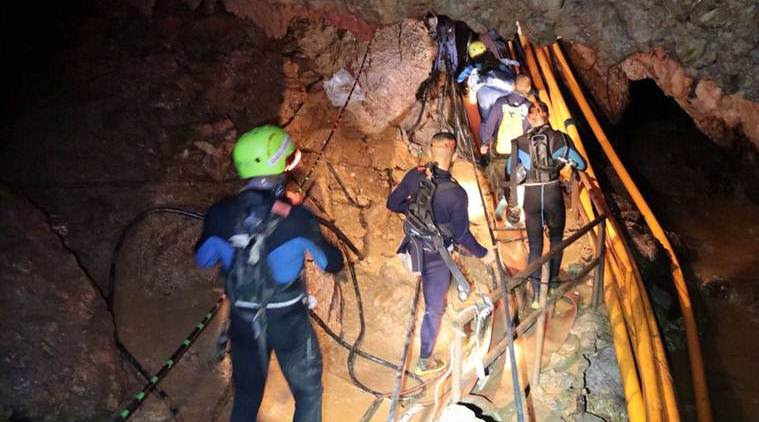Lessons from Tham Luang
A crisis can either unite people or expose faultlines. Rescue of stranded children in Thailand can teach India.

Thai rescue team members walk inside a cave where 12 boys and their soccer coach were trapped. (Royal Thai Navy via AP/File)
The rescue of the Wild Boar football team and their coach from the Tham Luang caves in Thailand was spectacular, not in my mind just because of its difficulty or the skill and courage of the divers, but for a set of reasons that have not found much echo in the media. Let me highlight what I found awe-inspiring.
A youth football team of 12 boys, between the ages of 11 and 16, and a 25-year-old coach go missing. A search operation is launched and it becomes clear that the boys are lost inside the treacherous Tham Luang caves. Premature heavy rains have flooded the caves and made them inaccessible. To rescue the boys, the authorities start pumping water out of the caves and invite the Thai navy seals to launch a rescue mission. The team reaches the conclusion that international help is needed for the search operation as they do not have the requisite cave diving expertise. A British cartographer of the Tham Luang cave, resident in Thailand, suggests two expert cave divers from Britain be called in. With their help, an international rescue team is set up and works in complete coordination with a single chain of command. They work out a daring rescue strategy which we all know was successful and saved the entire team against heavy odds. This part has been widely applauded.
What has scarcely been highlighted is the role of different groups during the entire rescue — the parents, the media, political parties, the international rescue team and the chain of command (the navy seals and doctors who stayed inside with the team) and the conduct of the football team and the coach inside the cave. This was a human interest story and captivated the whole world. Yet, the behaviour of the different groups in Thailand was exemplary in avoiding any sensationalism and partisanship.
Through the entire rescue, the parents stayed together. None of them blamed the coach nor went after his family. They supported each other and did not interfere with the rescue. They did not try to get their kids out first and when the children came out in batches stayed together until all the boys were rescued. They did not try and meet the kids before they were allowed too and none gave long press interviews during or after the rescue.
The media focused on the rescue mission, and did professional reporting based on the reports provided to them by the rescue team. They did not try and interview the parents separately, did not reach out to friends or teachers and did not second-guess the rescue effort. Even after the rescue, they did not sensationalise the event. They did not overplay Elon Musk’s offer when it was refused by the rescue team. They reported with empathy and stayed within bounds. When they were told that they can meet the children only once before they returned home and needed to get their questions vetted by a psychiatrist, they complied. No one tried to get a breaking story. Contrast this with the role the media played during the terrorist attack in Mumbai. There was 24/7 reporting, every channel outdoing the other, playing straight into the hands of the terrorists. No one cared, channel ratings were paramount.
Political parties completely stayed out of the process. The local governor was in charge and people let him get on with the job. No red shirt, yellow shirt protests. No fault finding. No complaints on why the caves were not shut in the rainy season, no comments on how they were poorly maintained, or on the speed of action and the time taken to complete the rescue. The only time the prime minister spoke was when it was over. He did not seek any credit. The governor who organised the entire rescue effort is still barely recognisable.
The rescue team had a clear chain of command, no contradictory messages, once a decision was taken it was executed. Media briefings were coordinated and even after the rescue there was hardly any big media outreach. The only time there was any back and forth was when a diver hit out against Elon Musk who had called him a paedophile after the rescue team refused his submarine. In fact, the only two people who tried to capture the spotlight were President Donald Trump saying the Americans were leading the rescue, and Elon Musk who wanted to test his unworkable submarine inside the cave.
The boys and their coach: The young kids, caught in a terrifying cave without food with a 25-year-old coach, stayed together. No bickering, no blame. The coach did not eat so that the boys could share the limited food they had with them, helped them meditate to reduce the panic and fear. The boys themselves sent hopeful messages to their parents apologising, not blaming anyone.
The absence of blame or politicking, parental unity, media restraint, football team cohesion, rescue team clarity, were all truly remarkable. An ex-navy seal died and his wife showed composure, a grief wrapped in pride. The first thing the team did after their release was to organise a prayer for the brave ex-navy seal in the hospital. The character of the nation on display was awe-inspiring.
What lessons are there in the rescue for us as a nation? Tragedies at a national scale either create the conditions for national unity or give voice to nation-destroying partisan primordial tendencies. A communal riot, race conflicts, caste wars are all deeply divisive, alternatively, a natural calamity like a tsunami or flooding of children inside a cave, or a terrorist attack on a city, offer an opportunity to strengthen the underlying national bonds. But this may not happen due to apathy, sensationalism or self-interest. Watching the dignity of the Thais deal with the cave rescue have major lessons for us. But will we learn?
The writer is chairman, Asia Pacific, Boston Consulting Group. Views are personal
For all the latest Opinion News, download Indian Express App
More From Janmejaya Sinha
- A drive to clean airElectric vehicles can reduce urban pollution significantly. India needs to offer monetary incentives and other subsidies to manufacturers...
- India needs a new IASAn increasingly specialised, complex and changing world demands a more effective bureaucracy ..
- Trillions for the takingDespite the spectre of a Trump presidency on the world economy, tapping emerging markets can mean big bucks for global business ..








































No hay comentarios:
Publicar un comentario